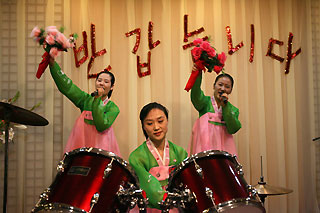Firm, prudent response needed, UN envoy says
'We see eye to eye on nuke danger'
China called yesterday for diplomatic efforts to resolve the crisis caused by
a nuclear test conducted by the Democratic People's Republic of Korea (DPRK),
and ruled out military action as punishment.
 |
|
| North
Korean women perform in a North Korean restaurant in a hotel in Shanghai
October 10, 2006. [Reuters] |
|
"The international community and the United Nations should take positive and
appropriate measures that will help the process of denuclearization on the
Korean Peninsula," Foreign Ministry spokesman Liu Jianchao told a news briefing.
"Any action towards the DPRK should be beneficial to the denuclearization of
the peninsula, peace and stability in Northeast Asia and the resumption of the
Six-Party Talks."
He said China does not endorse any military action against the DPRK, calling
it "unimaginable."
"We are firmly against that."
Liu said China was conferring with other UN Security Council members over
possible next steps.
He defended the Six-Party Talks, aimed at making the Korean Peninsula free of
nuclear weapons, saying Monday's nuclear test "should not be regarded as a
failure of China's foreign policy or a failure of the Six-Party mechanism."
"Facts have proved that the Six-Party Talks are the best way to resolve the
issue," Liu said.
"The concerned parties should continue to generate efforts to keep the
mechanism on track."
The test came after five rounds of the Six-Party Talks, which China hosted
between 2003 and 2005.
The talks involving China, the DPRK, the United States, the Republic of
Korea, Russia and Japan stalled last November after Pyongyang criticized
Washington for imposing economic sanctions.
China calls on all parties to stick to consultation and dialogue and seek a
peaceful solution of the nuclear issue, Liu said. He reiterated China's
opposition against the nuclearization of the Korean Peninsula. "This stance has
not changed."
Liu admitted that the nuclear test would undoubtedly "exert a negative
impact" on ties with the DPRK.
But he said China would continue to develop good-neighbourly and friendly
co-operation with the DPRK and this policy is "unshakable."
"In dealing with the bilateral ties, we stick to two principles: First, they
should serve the common interests of both sides; second, they should be
conducive to peace, stability and development of Korean Peninsula and Northeast
Asia," Liu said.
He urged the DPRK to stop taking any action that may worsen the current
situation.
He added that the humanitarian needs of the DPRK people should be taken into
full consideration when any action is taken.
He also said that China has kept a close eye on the aftermath of the nuclear
test, but so far no atmospheric pollution has been detected.
In a related development, Foreign Minister Li Zhaoxing yesterday held
separate telephone talks with European Union Foreign Policy Chief Javier Solana
and Canadian Foreign Minister Peter MacKay. Li reaffirmed China's stance on the
nuclear test.